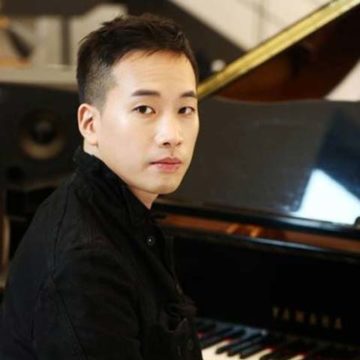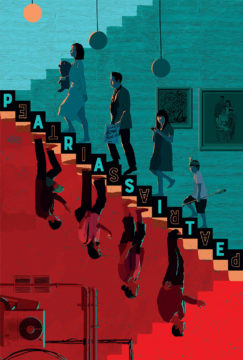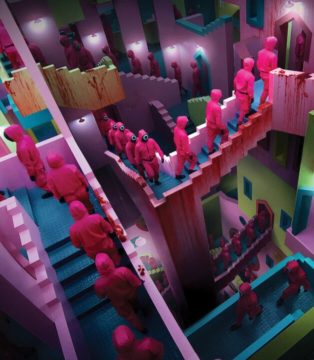by Brooks Riley
 A soft-spoken, self-effacing young man from Seoul may be the most listened-to living composer on the planet right now, with two blockbuster works of cinema and TV on his resumé. Not only did Jung Jaeil compose the score for the Oscar-winning Parasite, but his subsequent gig, Squid Game, has just stormed into the record books: Seen and heard by hundreds of millions by now, it has become a global phenomenon, another sign of South Korea’s approaching and encroaching hegemony over all things cultural.
A soft-spoken, self-effacing young man from Seoul may be the most listened-to living composer on the planet right now, with two blockbuster works of cinema and TV on his resumé. Not only did Jung Jaeil compose the score for the Oscar-winning Parasite, but his subsequent gig, Squid Game, has just stormed into the record books: Seen and heard by hundreds of millions by now, it has become a global phenomenon, another sign of South Korea’s approaching and encroaching hegemony over all things cultural.
Learning more about the elusive Mr. Jung is not as easy as it would seem, even if he’s all over YouTube and even if his English, if you can find it, is as elegant and formal as it is fluent: Thank you so very much, he said last week upon receiving a prize for Squid Game (that inserted ‘so’ a rarity of politesse). His Wikipedia entry is woefully thin, and mystery shrouds his early life. Most of his interviews are in Korean and not subtitled, including a Q&A on stage with Bong Joon-ho, director of Parasite, who discovered Jung Jaeil through a 2014 film Bong wrote and produced, Sea Fog (Haemoo).
As obscure as his biography may be, the task of placing this peripatetic music maker inside a category is even more daunting. From an astonishingly early age, as a quasi auto-didact, he has straddled the yawning divide between pop and classical, performing in a funk band while immersing himself in the Western canon. He wrote his first film music at 15, for an R-rated movie he wasn’t even old enough to see. It’s been a long journey from funk to punk to the barefoot-performing monk he resembles today at 39, but Jung is a master of metamorphosis, his musical transformations enhanced by fluctuating involvements in social and global issues, historical commemorations, theatre, art installations and pop music, as well as his attention to traditional Korean music—all adding up to many more commitments than one might expect from any other producer of tonal atmosphere for worldwide box-office hits.
The more virtual time I spend in South Korea, the more I am reminded of the Renaissance, when an explosion of creativity occurred in tandem with the growing prosperity and secularization of the Italian city-states, especially Florence under the Medicis. South Korea, a war-torn, underdeveloped nation mere decades ago, is now among the world’s most prosperous nations, thriving not just from its industrial and technological successes like Samsung and Hyundai, but more importantly from hallyu, or Korean Wave, the cultural export of high-end K-dramas, K-pop, and K-cinema—providing the cars we drive, the smart phones we use, and increasingly, the music we listen to and the dramas we stream—in other words, filling up the hours of our days, one way or another. It’s no accident that ‘soft power’ , as defined by Joseph S. Nye Jr. in his 2004 book, was invoked by President Moon last week as he congratulated BTS on receiving an American award. According to Monocle Magazine, in 2020 South Korea was second only to Germany in soft power influence. The United States, as the long-standing global Leitkultur, is losing its grip, its music trapped in a loop, while South Koreans have found ways to reinvent pop music, or at least rejuvenate it, and market it back to us.
If I wish to study the Renaissance I try to move like a mist through the streets of late 15th century Florence, absorbing what I’ve never experienced. I visit the ateliers of famous painters, enjoy the mingled scents of sweat and paint, and listen to gossip about da Vinci, Michelangelo, and Raphael. These invented memories are not unlike my cyber journeys through Seoul, as I rely on various media to place myself in the right places at the right time. Is that top-floor atelier Jung Jaeil’s studio? Let’s go there, where Jung plays and sings new music he has composed to the surviving lyrics of a 1919 song by seven women imprisoned as resistance fighters against the Japanese occupation.
The music business in South Korea has been booming for much longer than we in the West have been aware. The country accounts for 20 percent of worldwide classical music sales, with a much younger audience base than in the West. The K-pop juggernaut needs no elucidation, but ballads and soundtrack music for the many K-dramas are a lesser known industry unto itself. Koreans have embraced Western music and elaborated on it, and much like their rap styles, which have pushed the boundaries of the spoken voice beyond rhythm and rage, their adventurous arrangements don’t shy away from crossover improbabilities. (Take TVXQ!’s zany 2004 hit Tri-Angle, which plunders the opening bars of Mozart’s Symphony No. 40 before jolting us out of our seats with a heavy metal guitar riff.)
So where does Jung Jaeil fit in this hotbed of musical activity? The answer is, everywhere—like a chameleon, adapting his style to the requirements of a genre. If it’s pop, such as a song written for his frequent collaborator, singer Park Hyo Shin, he provides just the right tone and arrangement for the emotional thrust of Park’s powerfully lyrical voice. If it’s IU, the most successful female pop singer in South Korea (and star of My Mister), he makes her shine in an informal, lovely rendition of an old song—a performance so intimate that it recalls an evening at home with Schubert. If it’s a performance at the Blue House (South Korea’s White House) for a visiting head of state (in this case, Trump in 2017), he dazzles with Binari, a traditional Korean music piece fused with a classical string quartet and infused with nuances of jazz and even the blues.
A key to Jung’s brilliance may lie in his ability to channel music from across the spectrum of genres. A hint can already be found in his spoken English, especially his grasp of the vernacular, a sign of advanced auditory sensitivity. The man has an ear for alien sounds, and finds inspiration in unlikely places. As a fan of the nearly forgotten Bosnian/Serbian director Emir Kusturica, he was inspired by those legendary Balkan trumpets in Underground, Kusturica’s 1995 Cannes-winning masterpiece, to use such furious tempi for the underground mall chase scene in Bong Joon Ho’s Netflix film Okja. Where Kusturica used the trumpeters as audio-visual exclamation points following the actions of his main characters, Jung uses them to endow the chase sequence with a humorous urgency.
As a film composer, Jung is confrontational, a tonal alchemist who combines opposing, incompatible elements to create effects of extraordinary impact. The scene at the slaughterhouse in Okja, when Mija leads Okja to safety past hundreds of pigs awaiting their doom behind a fence, is scored with an ethereal female liturgical chorus singing over the desperate grunts what must be a kyrie eleison (Lord, have mercy) that transforms the scene into the holy horror that is.
Another inspired musical collision occurs in Parasite, in the track Camping, which couples an Alpine village folk choir with the otherworldly sound of a saw being played, an instrument which Jung first heard in the French film Delicatessen and went to some lengths to learn, in order to play it on the soundtrack. The juxtaposition of this unexpected musical whimsy with the Kim family’s stolen moments of R & R throws a sunny omen over their scenes of enjoyment.
 The entire soundtrack of Parasite is a revelation, a powerful and yet mostly unobtrusive collection of perfectly utilized eclectic musical elements. But nothing beats the way Jung has channeled the baroque, mashing it up to underscore two riotous sequences straight out of a cinematic opera buffa—which Parasite often is. The Belt of Faith partners the devious unraveling of the Kim family’s plot against the Parks’ housekeeper, finishing with a grandiose flourish over an unforgettable image, Mrs. Park’s horror at the housekeeper’s ‘bloodied’ tissue. Zappaguri, on the other hand, matches the rollicking speed with which Mrs. Kim must cook a ram-don while her family desperately remove the traces of their illicit takeover of the Park house before the Parks arrive home.
The entire soundtrack of Parasite is a revelation, a powerful and yet mostly unobtrusive collection of perfectly utilized eclectic musical elements. But nothing beats the way Jung has channeled the baroque, mashing it up to underscore two riotous sequences straight out of a cinematic opera buffa—which Parasite often is. The Belt of Faith partners the devious unraveling of the Kim family’s plot against the Parks’ housekeeper, finishing with a grandiose flourish over an unforgettable image, Mrs. Park’s horror at the housekeeper’s ‘bloodied’ tissue. Zappaguri, on the other hand, matches the rollicking speed with which Mrs. Kim must cook a ram-don while her family desperately remove the traces of their illicit takeover of the Park house before the Parks arrive home.
According to Jung, his first six scoring attempts for The Belt of Faith were rejected by Bong, a painful process that could have tested their friendship. But Bong’s perfectionism ultimately paid off, leading to one of cinema’s most iconic chain of events. Zappaguri, on the other hand, was accepted at once.
 On quite a different musical terrain, the soundtrack of Squid Game has found a novel way to evoke the impending Grand Guignol of games, through the deceptively simple, but menacing childlike track Way back then, unforgettable once it’s heard, a minor-key dystopian ditty that will follow us throughout the series and possibly long after. The collection of tracks is singularly lacking in emotion except for the sad nostalgic feel of I remember my name and the haunting paean to grief, It hurts so bad. This seems a deliberate alienation effect to counterbalance all that raw emotion spilling out on the screen.
On quite a different musical terrain, the soundtrack of Squid Game has found a novel way to evoke the impending Grand Guignol of games, through the deceptively simple, but menacing childlike track Way back then, unforgettable once it’s heard, a minor-key dystopian ditty that will follow us throughout the series and possibly long after. The collection of tracks is singularly lacking in emotion except for the sad nostalgic feel of I remember my name and the haunting paean to grief, It hurts so bad. This seems a deliberate alienation effect to counterbalance all that raw emotion spilling out on the screen.
Jung’s lack of formal musical education, except for a year at a Jazz Academy when he was 13, has had the paradoxical effect of releasing him from the strictures other composers suffer under. His prolific output is marked by the urge to try new things and a willingness to break rules if it moves him closer to his multiple goals. That means he will probably find his critics among those who compose by the book. Still, his prodigious talent for learning-by-doing has already taken him farther than most of his colleagues.
Much of his best work utilizes orchestral strings to create lower-register adagios or andantes full of pain and terror, as though he were trying to dig his way down into this listener’s soul. On the other hand, in his latest album Psalms, he relies on human voices, an a capella work of stunning effect, reminiscent of both medieval chants and Arvo Pärt. In a delightful, subtitled interview with an AI machine for Universal Music, Jung speaks in detail about this work and other unexpected aspects of his life.
How an artist interacts with his beholder is one of the ongoing mysteries of the artistic experience. Sometimes it’s just the work that casts a spell, divulging nothing more about its author than a name and a date. But there are other artists who seem to be exposed, as the filaments of their spirit throw off light, sometimes across centuries, luring the beholder into a wordless dialogue. Jung Jaeil is such an artist. So it was no surprise for me to learn from a Billboard interview, that he travels to Wuppertal, Germany two or three times a year to watch the works of the late choreographer Pina Bausch, a favorite of mine for decades. I understand him.
***
Extra reading: here
Jung’s Spotify album discography
The Score podcast interview with Jung Jaeil starts at 37:12
Jung Jaeil and Park Hyo Shin first met during their mandatory military service 2011.
The complete soundtrack of Sea Fog (Haemoo) 2014 on YouTube
